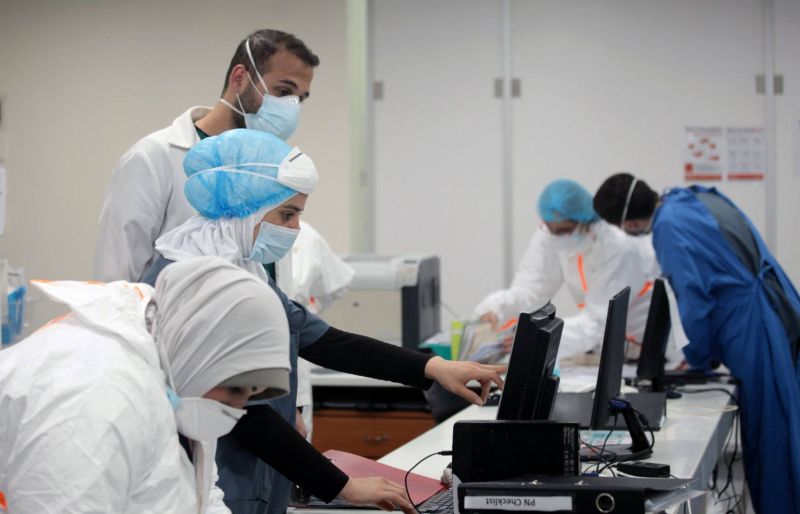
Medical staff members work at an intensive care unit for COVID-19 at Rafik Hariri University Hospital in Beirut. (Credit: Emilie Madi/Reuters)
BEIRUT — Lebanon’s hospitals are struggling to cope under the grueling pressure of treating an endless stream of COVID-19 patients as the pandemic reached its deadliest day yet.
The coronavirus lockdown brought in to stem the flow of new cases, however, is placing an additional burden on those already struggling to cope amid dire economic circumstances — sparking protests scattered across the country.
Lebanon broke the grim record of 73 new coronavirus-related deaths Tuesday, as the Health Ministry registered 3,505 new cases of COVID-19. A record 937 people were being treated in intensive care units.
Pierre Bou Khalil, the head of pulmonary and critical care at the American University of Beirut Medical Center, told L’Orient Today the pressure on staff and resources had become “exponentially worse.”
“We are being faced with large numbers of patients — we are overwhelmed,” he said.
According to the latest figures from the World Health Organization, 94.4 percent of intensive care beds are occupied. All of the ICUs in Beirut are at capacity.
Hospitals are desperately trying to keep up with the demand for intensive care beds, but shortages of staff, medication and equipment make it difficult.
In the past few weeks, construction workers and medical staff at Mount Lebanon Hospital in Hazmieh were able to repurpose an entire wing for critical COVID-19 patients, installing negative pressure systems to remove contaminated air from rooms.
However, they are now struggling to find the equipment needed to care for COVID-19 patients, according to medical director Elie Gharios.
“We are looking for ventilators, but they are very rare on the market, and very expensive,” he said. “They cost up to $40,000 each — in fresh dollars.”
Even when expansion is successful, new beds quickly become occupied.
At Rafik Hariri University Hospital, the primary center for the care of COVID-19 patients, the addition of 10 new ICU beds is making little difference.
“Despite our new expansion, I do not expect our staff in [the] ER to get any respite,” hospital manager Firass Abiad said on Twitter. “There are a lot of sick Covid patients, and this is not a time for rest.”
At Abdullah Al Rassi Governmental Hospital in Halba, Akkar, all 12 ICU beds are “constantly full,” manager Mohammad Khodrin said, despite the recent addition of four new beds.
So far, the strict coronavirus lockdown and 24-hour curfew, introduced on Jan. 14, is having minimal impact on admissions.
“Patients are still continuing to arrive at our doors,” Khodrin said. “They are often exhausted and very weak by the time they get here.”
The latest restrictions on movement were originally scheduled to be relaxed on Monday, but have been extended by a further two weeks — a significant burden for those already struggling.
Protests erupted in Tripoli Tuesday evening, with demonstrators gathering outside the northern city’s serail and in Al-Nour Square. For the second consecutive day, they were met with an aggressive response from the Lebanese Army, which fired tear gas to disperse protesters.
Confrontations with the army on Monday night led to the injuries of 41 people, according to the Lebanese Red Cross, among whom 12 were taken to hospitals for treatment.
Earlier Tuesday, there were a number of small demonstrations across the country protesting the lockdown. Protesters pushed over garbage cans on Beirut’s Corniche al-Mazraa and others blocked the main highway leading south from Beirut with burning tires at Jiyyeh.
The government has failed to provide adequate aid to the most vulnerable families, and those who depend on daily earning are struggling to make ends meet. According to a survey conducted by Siren Analytics in mid-January, 74 percent of people who said they were not able to abide with coronavirus restrictions cited living conditions as the primary reason.
With the end of the lockdown on Feb. 8, the national COVID-19 vaccination program is set to begin. However, it has already hit a snag.
The launch of the online registration platform for people wishing to receive the COVID-19 vaccine was delayed until Thursday as final details for the rollout are ironed out, a spokesperson for caretaker Health Minister Hamad Hassan, Reda Al-Moussawi, told L’Orient Today.
It will now be launched following the announcement of the full plan for vaccine distribution, including the final list of priority groups and vaccination centers, set to be delivered from the Grand Serail on Wednesday, Moussawi said.
The platform was originally scheduled to go live on Monday ahead of the arrival of the first batch of 60,000 vaccine doses secured via an agreement with US pharmaceutical giant Pfizer.
Lebanon is set to receive a total of 2.1 million doses under the deal, in addition to a further 2.6 million from the World Health Organization’s COVAX platform. MP Assem Araji (Future/Zahle), the head of the parliamentary health committee, has previously said that talks are also underway to secure additional doses from other sources, such as Europe’s AstraZeneca.